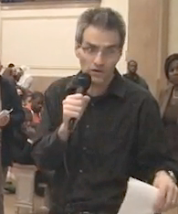III. Strategy and tactics for a good contract
What we as a union can control in the negotiation of each contract are: our political outlook, stance, and alliances, our UFT-initiated legislative efforts, our strategy and tactics, and our internal organization. It is incumbent upon an opposition to present a credible analysis of the situation and positive proposals for an alternative response to the difficulties that we face.
The strategy that Unity/UFT has adopted since the 1975 NYC fiscal crisis may be fairly described as an organized retreat. The challenge this poses for them is how to win the ratification of bad contracts without drawing criticism to their own role as a crucial enabler of this great ratcheting downwards.
With each new negotiation, Unity/UFT proceeds from three basic questions:(a) What can we trade off?When the same caucus is elected to run the UFT year after year, members can expect the same results.
(b) Who can be sold out? and
(c) How much can the rank-and-file be induced to give back?
Weingarten has pointed to increases in salary as a tangible benefit accrued to the membership when it has gone along with mayoral control. Unity/UFT will even whisper privately when pressed, “It could have been worse” and “Imagine what the Post would do to us if we didn’t play ball.” They have generally avoided mentioning that approximately one-third of the salary increases they’ve negotiated in the past two contracts are not raises, but compensation for an extended working day and year. Most recently, they have agreed to changes in the pension for new employees that will require them to pay 4.8% into their pensions for their entire careers where previously contributions stopped after 10 years of service. Any gains in salary follow from the union’s policy of accommodation and trade-off with the Bloomberg administration.
With each new contract, how much say educators have in methodology, testing, school staffing, and other important issues diminishes as the union continues to sidestep the issue of the mayor’s failure to extend “collaboration” down to the school level.
Unity/UFT also cannot credibly proclaim to be in a collaborative mode with the mayor while the managers who do his bidding consistently sabotage the normal avenues for conflict resolution at the school and district levels. Grievances rarely bring relief: the DoE denies all Step I’s and forces an inordinate number of cases to arbitration, which in many cases the union is unwilling or unprepared to handle. Our union managers have consistently turned a blind eye to the mayor’s broad attack against senior teachers and other members brought up on charges that most certainly could be handled differently than through reassignment. The measure of collaboration is a willingness to resolve conflicts and seek consensus in the school community. So often it has been reduced instead to a photo op with the mayor.
Our profession is really threatened, and the union’s response has been anemic. In fact, the relationship between all levels of administration under this chancellorship and UFT members has been far from collaborative. Even the few remaining senior principals who know better, with retirement in sight and hefty bonuses at stake, don’t make a move without consulting legal. Collaboration with the Bloomberg administration is a one-way street. We collaborate and he promises not to inflict even greater pain.
Operating as they do in a “collaborative” mode, Unity/UFT caucus managers fail to acknowledge that in every struggle of labor and working people, solidarity is a crucial ingredient for success. It is, in fact, the foundation of unionism. Because Unity/UFT has no interest in building the kind of solidarity that makes a union strong, they can only accept crumbs at the negotiating table.
Monday, October 12, 2009
ICE platform, Part III
Subscribe to:
Post Comments (Atom)













No comments:
Post a Comment